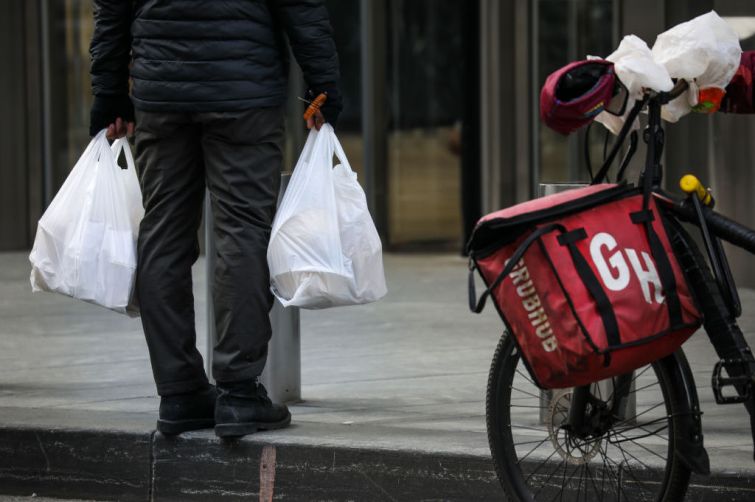DC Sues Grubhub for Allegedly Misleading Customers
By Chava Gourarie March 22, 2022 5:41 pm
reprints
The attorney general of Washington, D.C. has sued food delivery company Grubhub over alleged “deceptive and unfair practices” that Karl Racine’s office said misled consumers on its app and redirected revenue from local restaurants to the third-party app.
Apps such as Grubhub have been facing scrutiny from lawmakers and regulators in many cities because of how embedded they’ve become in the local economy. Over COVID-19, that’s only increased, as restaurants were forced to rely heavily on deliveries to customers still skittish about dining inside.
The suit, filed Monday in D.C. Superior Court, demands an end to a list of allegedly illegal practices, which would violate the Consumer Protection Procedure Act, as well as damages to the injured parties and civil penalties.
Among the allegations is GrubHub’s policy of adding non-partner restaurants to its app without disclosing to customers that the company has no relationship with the restaurants, often resulting in a bad experience for the customer. “There is a much greater likelihood that orders would take longer to fill, would be filled incorrectly, would be delivered cold, or would eventually be canceled altogether,” the complaint alleges.
In addition, customers searching through the app were routed, either through phone numbers or microsites designed to look like they were owned by the restaurant, to order through Grubhub. The customer had no way of knowing that the phone number and website were managed by Grubhub, the suit claims.
“This practice limits consumers’ ability to bypass Grubhub and deal directly with local restaurants without subjecting those restaurants to unnecessary commissions,” per the complaint.
Chicago-based Grubhub says its practices comply with D.C. law and has been in talks with the attorney general’s offices over the last year. “We are disappointed they have moved forward with this lawsuit because our practices have always complied with DC law, and in any event, many of the practices at issue have been discontinued,” a spokesperson for Grubhub said in a statement. “We will aggressively defend our business in court and look forward to continuing to serve D.C. restaurants and diners.”
Another set of allegations revolves around GrubHub’s disclosure of fees and hidden costs — or lack thereof. GrubHub lists prices that are higher than the restaurant’s prices without informing customers, and the company doesn’t disclose all its fees until the customer is checking out, the suit claims. Even then, the fees are hidden in line items that obscure what the company is paying for. Grubhub also advertises that a customer can “order online for free” though that is not the case unless the customer is ordering for pickup, the suit alleges.
Finally, at the start of the pandemic, GrubHub advertised a “Support for Support” promotion that would give customers $10 off orders of $30 or more. Customers believed the savings would help their local eateries, but instead, GrubHub passed the cost on to restaurants, according to Racine’s office. After reports exposed that GrubHub was reaping the benefits meant for struggling restaurants, GrubHub offered a $250 credit in compensation to the eateries, per the complaint.
GrubHub has already stopped some of the practices listed in the complaint, including the use of microsites and numbers that look like they belong to the restaurants, the former as of 2018 and the latter as of August 2021, per the complaint. It also added more disclosures about pricing and fees to its terms of use in December 2021.
The lawsuit is the latest in a string of complaints against third-party delivery apps, which take as much as 30 percent commission on every order.
Last year, officials in Chicago sued DoorDash and Grubhub for their policies and Washington, D.C., itself reached a settlement with DoorDash in 2019 after alleging the company misled customers about drivers’ tips. In New York City, the lawsuits have gone the other way. Last September, DoorDash, Grubhub and Uber Eats sued the city after it imposed a cap on the service fees they could charge for deliveries.
Chava Gourarie can be reached at cgourarie@commercialobserver.com.


